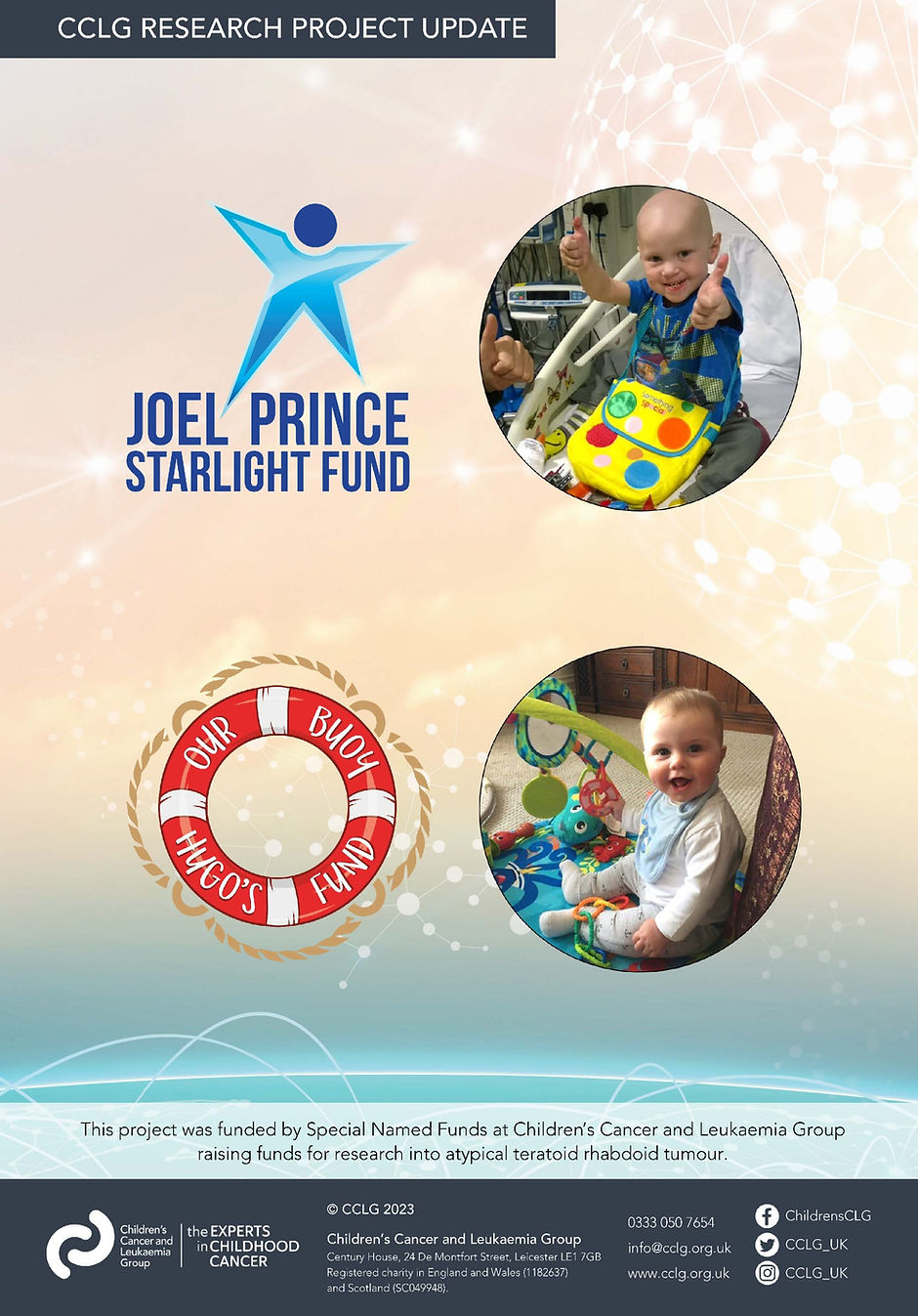
JPSF is funding a Research Project!
It has been nine years since we set up the Joel Prince Starlight Fund in memory of our gorgeous baby boy and we are so pleased to announce that to date we have raised just over £115,000. Of course, we couldn't have done this without all our wonderful fundraisers and supporters. Our intention was to use the money raised to help fund research into Atypical Teratoid Rhabdoid Tumors (ATRTs) so no child had to suffer the way our Joel did. After years of waiting for the right research project to be developed, we are so pleased to be able to announce that CCLG has joined up with Dr Daniel Williamson's lab team at Newcastle University who have developed a research project linked to our objectives. Alongside the new international SIOP-ATRT-01 clinical trial, Dr Williamson will use the state-of the-art genetic testing to analyse the UK patients' samples creating a valuable set of data that includes differences in tumours' molecular biology and how the patients responded to standardised treatments. Teams in other countries will also be using the same techniques to create datasets, which will be pooled at the end of the trial. Dr Williamson hopes that the internationally pooled data will help show whether biology predicts response to therapy, and therefore can be used to direct future treatments for patients with all types of ATRT, including spinal ATRTs.
This trial is the first opportunity we have had to fund a study which has enough patients to make a significant improvement to treatment.
Whilst the trial will be testing the best treatments, it will also be collecting lots of ATRT tumour samples. The funds donated by Joel Prince Starlight Fund will ensure that the UK patients enrolled on this trial will have their tumours analysed using state-of-the-art techniques, and means that we will be able to learn more about the best treatments for each type of ATRT.
For young cancer patients with ATRT the potential benefit of this project is the very real prospect of, in the future, tailoring treatment to their individual needs, to deliver only the therapy deemed to be necessary, potentially avoiding unnecessary treatments and any damaging long-term effects. Alternatively, when treatment is predicted to be ineffective, to be able to direct patients towards new targeted therapies.
We wish the team only best outcomes from their research and look forward to a brighter future for all ATRT cancer patients.






A letter of thanks from Dr Daniel Williamson & Simon Bailey, Newcastle University
"We would like to extend our heartfelt gratitude to the Joel Prince Starlight Fund and all their supporters for their generous backing of our research project.
Atypical Teratoid Rhabdoid Tumours (ATRT) are brain and spinal cord tumours that are aggressive and hard-to-treat. Current therapies are often ineffective or can lead to severe long-term effects. This means that doctors treating children with ATRT must attempt to manage the damaging effects of treatment whilst effectively fighting the cancer.
My lab team specialise in a type of molecular analysis that looks at the proteins and genetic changes present in cancer cells, which could help doctors with this problem.
By collecting samples of donated ATRT tumours over recent years and applying our state-of-the art molecular analyses, we are learning that not all ATRTs are the same. There appear to be at least three subtypes of ATRT that are loosely related to where the tumour grows. For example, spinal ATRTs appear to be most closely related to a type we call MYC ATRT. There are also some signs these subtypes might need different therapies.
Using AI, we can now analyse the biological data from tumours, like finding the subtype, and predict whether a patient will or will not respond to therapy. These tools could make a big difference for children worldwide – it could help doctors avoid overtreating children who should respond to current therapies, and avoid unhelpful therapies for those who need new or tailored treatments.
So, why is this not standard for ATRT patients, given that other types of childhood cancers benefit from these techniques? Simply put, ATRT is a very rare type of cancer. Until this point, we have only been able to collect small numbers of samples within the UK and this limits how confident we can be in our results. Fortunately, the first European ATRT clinical trial has just opened and will recruit over 350 patients with ATRT (including spinal ATRT).
The new project funded by the Joel Prince Starlight Foundation will allow us to collect molecular data from patients recruited onto the trial (and also from patients who have chosen to donate their tumour tissue but are not enrolled into the trial) and give them access to insights from our molecular biological analyses.
The unprecedented size of this study means that, by the end of the trial, we will be able to bring tailored molecular biology to all future ATRT patients, including those with spinal ATRT. We are tremendously excited to be tackling this project and once again many thanks to the Joel Prince Starlight Fund and all their supporters for making this happen."



